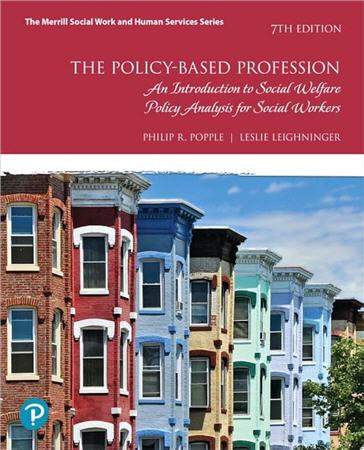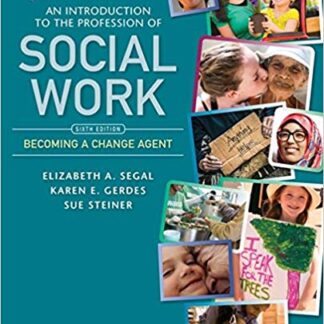Description
The Policy-Based Profession: An Introduction to Social Welfare Policy Analysis for Social Workers 7th Edition, ISBN-13: 978-0134794297
[PDF eBook eTextbook] – Available Instantly
- Publisher : Pearson; 7th edition (March 2, 2018)
- Language : English
- 368 pages
- ISBN-10 : 013479429X
- ISBN-13 : 978-0134794297
Help students connect social policy to the everyday practice of social work.
The Policy-Based Profession provides students with a process for analyzing policies that will help them with their careers in social work. It offers a detailed foundation for policy analysis, including chapters on historical, economic, and social policy analysis. Students then learn to apply the analysis framework to representative policies and issues in the fields of public welfare, aging, mental health, substance abuse, health, child welfare, and immigration.
Correlated with the most recent Council on Social Work Education (CSWE) Competencies, the 7th Edition includes the most recent research, theories, and political developments impacting the field. An entirely new chapter on immigration policy highlights this critical social justice issue, the health chapter delves into recent happenings in health care reform, and the mental health chapter includes material on the opioid epidemic and returning veterans.
Table of Contents:
Preface
New to This Edition
Brief Contents
Contents
Part One Social Welfare Policy and the Social Work Profession
1 The Policy-Based Profession
Learning Outcomes
Chapter Outline
The Target of Social Work—The Individual and Society
The Social Function of Social Work
The Dual Targets of Social Work
The Dominance of Micropractice
The Individual Is the Most Immediate Target for Change
The Conservative Nature of U.S. Society
Professionalization
Social Work’s Pursuit of Professional Status
The Policy-Based Profession
Expert Technique
Professional Practice within an Organizational Context
Social Work as a Policy-Based Profession: Practice Implications
Social Welfare Policy and Social Work Competencies
Policy Practice as a Social Worker Role
The Importance of Understanding Social Welfare Policy for the Direct-Practice Social Worker
Policy Determines the Major Goals of Service
Policy Determines Characteristics of Clientele
Policy Determines Who Will Get Services
Policy Specifies, or Restricts, Certain Options for Clients
Policy Determines the Theoretical Focus of Services
Conclusion
2 Defining Social Welfare Policy
Learning Outcomes
Chapter Outline
Social Welfare Policy—Basic Definition
Factors Complicating the Definition of Social Welfare Policy
Social Welfare or Social Well-Being?
Social Welfare Policy and Social Policy
Social Welfare Policy as an Academic Discipline and a Social Work Curriculum Area
Social Workers Are Interested in Social Welfare Policy in All Sectors of the Economy
The Multiple Levels of Social Welfare Policy
Macrolevel Policy
Mezzolevel Policy
Microlevel Policy
Social Welfare Policy—A Working Definition
Conclusion
Part Two Social Welfare Policy Analysis
Policy Analysis Outline
3 Social Welfare Policy Analysis
Learning Outcomes
Chapter Outline
The Many Meanings of Policy Analysis
Methods of Policy Analysis
Descriptive Analysis
Content Analysis
Choice Analysis
Bases of allocations
Types of benefits
Delivery structure
Financing benefits
Comparative Analysis
Historical Analysis
Process Analysis
Evaluation
Logical Evaluation
Quantitative Evaluation
Ethical Evaluation
Policy Analysis Methods as Ideal Types
Policy Analysis as Science, Art, and Politics
Conclusion
4 Policy Analysis from a Historical Perspective
Learning Outcomes
Chapter Outline
Historical Context of Social Welfare Policies
The Role of History in Understanding Policy
Examples of Policy History
Colonial Poor Relief
The Use of Orphan Asylums
Policies for Those with Handicaps
Historical Analysis and Policy Practice
Methods of Policy History
The Benton Park Crisis Center
Conclusion
5 Social/Economic Analysis
Learning Outcomes
Chapter Outline
Delineation of the Policy Under Analysis
Social Problem Analysis
Facts Related to the Problem
Completeness of Knowledge Related to the Problem
Population Affected by the Problem
Theory of Human Behavior Undergirding the Policy
Social Values Related to the Problem
Achievement and Success
Activity and Work
Moral Orientation
Humanitarian Mores
Efficiency and Practicality
Progress
Material Comfort
Equality
Freedom
External Conformity
Science and Secular Rationality
Nationalism-Patriotism
Democracy
Individual Personality
Racism, Sexism, and Related Group Superiority Themes
Contradictions in the U.S. Value System
Goals of the Policy Under Analysis
Hypotheses Underlying the Policy
Economic Analysis
Macroeconomic Analysis
Opportunity Cost
Effects on Individual Consumer Behavior
Conclusion
Part Three The Framework Applied
6 Fighting Poverty: Temporary Assistance for Needy Families
Learning Outcomes
Chapter Outline
Historical Analysis
Social Service Strategies
Institutional Strategies
Human Capital Strategies
Job Creation and Subsidization Strategies
Child Support Strategies
The Effort to Reform Welfare
Social Analysis
Problem Description
Population
Size
Cost
Race
Family Size
Mothers’ Marital Status
Age of Mothers
Education
Length of Time on Welfare (Spells)
The onion metaphor
TANF time limits
Relevant Research
Values and Welfare Reform
The United States as the Land of Opportunity
Individualism
Work
The Traditional Nuclear Family
Humanitarianism
Sense of Community
Economic Analysis
Macroeconomic Issues
How Much Does Public Assistance Actually Cost?
Is the Cost of Public Assistance Growing?
Prospects for Employment of Welfare Recipients
Microeconomic Analysis
Is Public Assistance a Work Disincentive?
Economic Survival Strategies of Welfare Recipients
The Effects of Public Assistance on Family Structure
Evaluation
Is TANF Succeeding?
TANF and the Welfare Rolls
TANF and the Quality of Life of the Poor
Wages of former recipients
Does TANF increase labor force participation?
Are adequate support services available?
Welfare reform and the well-being of children
Problems facing the TANF program
TANF caseloads are not reaching the “inner core of the onion”
Welfare reform has been in a virtuous cycle
Conclusion
American Values Related to Welfare have Permanently Changed
Welfare is not the Problem; Poverty is the Problem
Public Assistance is a Social Condition, Not a Social Problem
7 Aging: Social Security as an Entitlement
Learning Outcomes
Chapter Outline
The Problem That Social Security Was Developed to Solve
The Social Security Act of 1935
Historical Development of Social Security Programs in the United States
Precedents of the Social Security Act
Creation of the Social Security Act
Changes in Social Security
Contemporary Analysis of Social Security
Social Analysis
Political Analysis
Economic Analysis and Proposals for Reform
The Older Americans Act
Pensions
End of Life
Conclusion
8 Mental Health and Substance Abuse
Learning Outcomes
Chapter Outline
The Problem of Mental Illness
The Problem of Substance Abuse
The History of Substance Abuse Policies
History of Mental Health Policy
Social Analysis
Mental Health
Substance Abuse
Political Analysis
Mental Health
Substance Abuse
Drug Testing
Economic Analysis
Mental Health
Substance Abuse
Separation of Treatment for Those with Mental Health and Substance Abuse
Emerging Policy Issues
Diagnostic and Statistical Manual of Mental Disorders–5 (DSM5)
Autism and Vaccination
Mental Health in Cyberspace
The Mental Health of Veterans
Gun Violence and Mental Health
Opioid Epidemic
Conclusion
9 Health
Learning Outcomes
Chapter Outline
The Problem That Health Policy Was Developed to Solve
The Proposed Solution: The Patient Protection and Affordable Care Act of 2010
Access
Costs
History of Health Care Policies
Social Analysis of Health Policy
Economic Analysis of Health Policy
Hospitals
Drugs
Insurance
Physicians
State Governments
Political Analysis of Health Policy
Program/Policy Evaluation
Conclusion
10 Child Welfare: Family Preservation Policy
Learning Outcomes
Chapter Outline
Historical Analysis
The Child Rescue Movement
Social Work Takes Over
Child Abuse Becomes the Dominant Theme
Foster Care—From Solution to Problem
The Emergence of Family Preservation
Social Analysis
Problem Description
Descriptive Data
Relevant Research
Is Family Preservation Policy in Accord with Research Findings?
Major Social Values Related to Family Preservation
Family Preservation Goals
Hypotheses
Political Analysis
Economic Analysis
Policy/Program Evaluation
Current Proposals for Policy Reform
Conclusion
11 Immigration
Learning Outcomes
Chapter Outline
The Problems That Immigration Policy Is Attempting to Solve
Historical Analysis
Front Door
Side Door
Back Door
The DREAM Act
Current Immigration Process
Social Analysis
Crime
Terrorism
Cultural Insecurity
Economic Analysis
Jobs
Public Resources
Political Analysis
The Current Policy Arena
The Wall
The Ban
Deportation
Conclusion
Part Four Taking Action
12 Politics and Social Welfare Policy
Learning Outcomes
Chapter Outline
The Politics of Policymaking
Models of Policymaking
Who Makes Policy?
Pluralism
Public Choice Theory
Elitist Model
Neo-Elitist Model
How Are Policies Made?
Rational Decision Making
Incrementalism
Conflict Theory
Phases in the Policy Process
Problem Definition and Agenda Setting
Legitimation
Policy Implementation
Conclusion
13 Taking Action: Policy Practice for Social Workers
Learning Outcomes
Chapter Outline
Analytical Skill: Program Evaluation
Interactional Skills: Negotiation and Persuasion
Subprocesses of Negotiation
Distributive Bargaining
Integrative Bargaining
Attitudinal Structuring
Intraorganizational Bargaining
Stages of Negotiation
The Preconference Stage
The Conference Stage
The Postconference Stage
Strategy and Tactics in Negotiation
Preconference Strategies
Conference Strategies
Postconference Strategies
Political Skills
Building Coalitions
Information Dissemination
Lobbying
Political Action for Candidate Election
Running for Office
Conclusion
14 Conclusion
Learning Outcomes
Chapter Outline
Lessons From Policy Analysis
The Bottom Line Is the Bottom Line
Compassion and Protection: Dual Motivations for Social Welfare Policy
Ideology Drives Out Data in Social Welfare Policymaking
Policymakers Are Generally More Sophisticated Than They Appear
Our Expectations for Social Welfare Policy Are Unrealistic
Lower Your Expectations—Expect Change to Cost Much More than Predicted
Creaming Is Okay
Don’t Expect to Scrape the Bottom of the Barrel
Don’t Allow the Best to Defeat the Good
Be Multifaceted but Not Holistic
References
Index
What makes us different?
• Instant Download
• Always Competitive Pricing
• 100% Privacy
• FREE Sample Available
• 24-7 LIVE Customer Support





